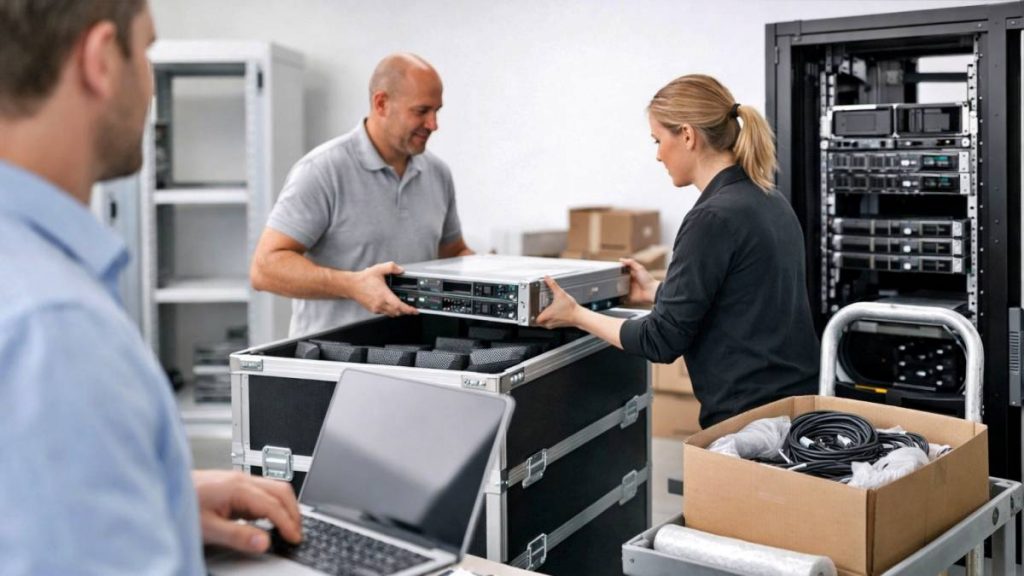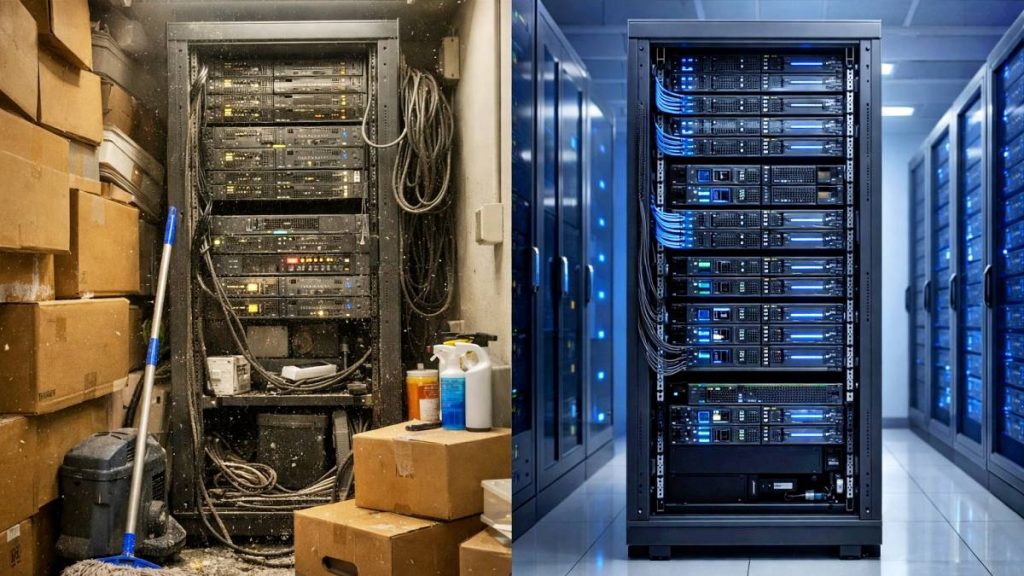For many growing businesses, technology infrastructure starts out in a spare office, a back room, or even a closet. It’s a practical and low-cost way to launch. But as business demands increase, those early setups often become bottlenecks—unreliable, insecure, and expensive to maintain. That’s when a key question arises: Is it time to move to colocation?
The shift from on-premises IT infrastructure to colocated infrastructure in a professionally managed data center is a significant milestone. It’s not just about space—it’s about preparing your business for future growth, improving operational resilience, and ensuring your systems meet your needs. This article outlines the signs that it’s time to consider colocation, the benefits of making the move, and how Datacate helps businesses of all sizes confidently navigate that transition.
Why Businesses Start In-House
Most companies begin their IT journey with infrastructure hosted on-premises. It’s an understandable decision—initial costs are lower, control is high, and it works for a small team with basic needs.
But growth introduces complexity. As your business scales, in-house systems often struggle to meet demand:
- Performance lags during peak usage
- Hardware reliability becomes a concern
- Cooling and power demands increase
- Downtime risk grows, along with the consequences
- Security and compliance become more challenging to manage
Eventually, your IT closet looks less like a viable solution and more like a liability. That’s when it’s time to evaluate colocation.
Key Indicators That It’s Time to Consider Colocation
When should you move your infrastructure out of the office and into a data center? Here are some clear signs that colocation should be on your radar:
1. You’re Outgrowing Your Current Infrastructure
If you find yourself adding servers or devices without the proper space, power, or cooling to support them, you’re likely reaching the limit of what an office-based setup can handle. Colocation offers the scalability to grow your infrastructure without expensive physical renovations.
2. Downtime Is Hurting Your Business
Unexpected outages—whether from hardware failure, power loss, or internet disruption—can grind operations to a halt. If your team depends on always-on systems, moving to a data center with redundant power, internet, and environmental controls ensures higher availability and reliability.
3. Security and Compliance Are Becoming Priorities
Handling sensitive data, working in regulated industries, or expanding your cybersecurity posture all demand more than a lock on the server room. Colocation in a secure facility like Datacate’s ensures your systems are protected with video surveillance, controlled access, and layered security measures. It also makes meeting compliance standards like HIPAA, PCI-DSS, or SOC 2 more achievable.
4. Your IT Team Is Spread Thin
If your internal IT staff spends too much time troubleshooting hardware issues or reacting to downtime, their focus is pulled from strategic projects. With colocation, you shift the responsibility for power, cooling, and physical infrastructure to a team of professionals—freeing your staff to focus on delivering value.
5. You Need Better Internet Connectivity
Office internet connections are typically designed for user activity, not server-grade traffic. Colocated infrastructure can take advantage of high-speed, redundant connections in carrier-neutral facilities—offering faster and more reliable performance.
6. You’re Preparing for Hybrid or Cloud Integration
Colocation can serve as a foundation for hybrid deployments if you’re exploring cloud services but aren’t ready to go all-in. You can blend physical and virtual environments more effectively by hosting physical infrastructure in a data center with cloud on-ramps and cross-connect options.
The Business Case for Colocation
The decision to colocate isn’t just a technical one—it’s a strategic investment. Here’s how businesses of all sizes benefit:
Cost Efficiency
Compared to building and maintaining your own enterprise-grade infrastructure, colocation offers a much lower total cost of ownership. You avoid significant upfront capital investments while enjoying resilient power, cooling, and connectivity.
Reliability and Uptime
Datacate’s data centers are designed with business continuity in mind. Redundant power (including UPS and generator systems), multi-homed internet connections, 24/7 monitoring, and physical security all ensure that your infrastructure stays online—even in the face of disruptions.
Performance and Scalability
Do you need to add more servers or bandwidth? Colocation makes it easy. Datacate’s facilities support rapid scaling without logistical headaches. You can deploy new systems quickly and accommodate spikes in demand without major rework.
Security and Compliance
Physical and network-level security are built into the foundation of Datacate’s services. From biometric access controls and video monitoring to advanced fire suppression and locked cabinets, colocated systems benefit from enterprise-grade protection. Our facilities also comply with key industry standards, helping your business stay audit-ready.
Expert Support
Datacate’s 24/7 on-site and remote hands services mean that expert help is always available. Whether you need equipment installed, cables rerouted, or systems restarted, our technicians are available day or night.
Why Businesses Choose Datacate
Datacate is more than just a place to park your servers—we’re a trusted technology partner. We work closely with clients across industries, from startups needing their first rack to enterprise clients managing complex hybrid environments.
Here’s what sets Datacate apart:
- Flexible Colocation Plans – From partial cabinets to full cages, you get the necessary space and power tailored to your budget and growth plans.
- Scalable Bandwidth Options – We provide redundant, high-speed internet options with low latency and guaranteed uptime SLAs.
- Hands-On Support – Our team offers around-the-clock monitoring, remote hands, and expert consulting services to keep your infrastructure performing at its best.
- Carrier-Neutral Connectivity – You have full control over your carrier and network design, with cross-connects to cloud providers, ISPs, and business partners – or use our house blend solution for all-purpose Internet connectivity.
- Sustainable Infrastructure – Our data centers are designed with energy efficiency in mind, helping you reduce your carbon footprint without sacrificing performance.
- On-Premise Professional Services – Need help planning, migrating, or managing your infrastructure? We provide consulting, project assistance, and ongoing support that complements your in-house IT team.
Making the Transition Smooth
Are you worried about moving your infrastructure from your office to a data center? Datacate helps make the transition seamless. We assist with planning, offer staging space and logistics coordination, and provide professional services to ensure minimal downtime during the move.
The process typically involves:
- Assessment – We evaluate your current setup and future needs.
- Planning – We help you design a colocation environment that aligns with your business goals.
- Migration – Our team works with you to move your equipment securely and efficiently.
- Optimization – Once installed, we monitor, maintain, and help you get the most out of your colocated systems.
Final Thoughts: Is Now the Right Time?
The decision to colocate isn’t just about solving today’s problems—it’s about positioning your business for growth, resilience, and long-term success.
Whether you’re a startup straining the limits of a server closet, a mid-sized firm ready for hybrid cloud integration, or an enterprise looking to reduce risk and cost, colocation offers a scalable, secure, and high-performance alternative.
At Datacate, we help businesses at every growth stage make smart infrastructure decisions. If you’re asking yourself whether it’s time to move to colocation, we’re ready to help you answer that question—and guide you every step of the way.
Let’s talk. Contact Datacate today to schedule a free consultation and learn how colocation can support your next growth phase.








